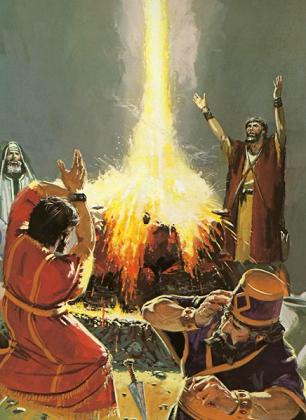I love the showdown of Elijah and the priests of Baal. Read the whole thing in
2 Kings 18:20-46. But I will tell you some of my favorites.
So those that are not quite as familiar with this story, Elijah tells the king to have a showdown to see which God is truly real. The God of Israel or Baal. They each were to build an altar and offer a sacrifice, and whichever God sent down fire from heaven was the real God of heaven and earth.
I am amazed at how Elijah is BY HIMSELF, but calm and confident during this whole process. He doesn't have any person with him, while the Baal guys have all those hundreds of priests and the king and queen on their side. Even the people watching the contest are too afraid to show their support of Elijah at this point. By noon Elijah is joking and mocking the priests as they try to get the fire to come down from heaven, saying maybe you need to call a little louder he might not be able to hear you because he's talking, or on a journey, or he's asleep. (
1 Kings 18:27) Finally at the end of the day, the priests give Elijah his chance since they had failed.
Elijah took twelve stones, symbolizing the twelve tribes of Israel, and built an altar to the Lord. He made a trench around the altar as well, then he put the wood in place and the bullock in pieces on the wood. Then he did a curious thing and had four barrels of water poured onto the burnt sacrifice and the wood. And then he did it a second time, and finally a third time. This is 12 barrels of water being poured on there, that is one wet altar!
But Elijah did this because the priests of Baal were known to rig their altars at times to make it seem as if fire was igniting it from heaven. One ancient writer said he “had seen under the altars of the heathens, holes dug in the earth with funnels proceeding from them, and communicating with openings on the tops of the altars. In the former the priests concealed fire, which, communicating through the funnels with the holes, set fire to the wood and consumed the sacrifice; and thus the simple people were led to believe that the sacrifice was consumed by a miraculous fire.” (
In Clarke, Commentary, 2:459.)
By drenching the altar in water, Elijah was also making it so the fire coming from heaven had to be miraculous and not just a quick bolt of lighting. But the fire didn't just consume the wood and flesh on the altar, it took up the stones and dust even around the altar, truly a great miracle from the one true God.
As mentioned in the
previous Elijah post the people saw this miracle and fell on their faces: and said "The Lord, he is the God; the Lord, he is the God" (
1 Kings 18:39) It then began to rain. Elijah then left. However, although those watching the contest were amazed and changed, Jezebel that evil woman that was called the downfall of the Northern Kingdom,
remember? she still wasn't changed. Her heart was too hardened to change, and she just got mad, and redoubled her efforts to have Elijah killed.
(Remember hard hearts are very bad. If you have stopped feeling emotion, besides anger this means you are on a very bad road paved by Satan. Feeling means you can still be brought to change and come back to God. The more we ignore promptings to change or feelings of guilt, etc, the more the light of Christ and the Spirit grows dim in our hearts, and goes away from us. The farther we are from that, the farther we are from God.)
Anyway, Elijah goes away to hide again, except this time he goes away to a place called Horeb the mount of God and is feeling lonely and depressed.
President Joseph Fielding Smith wrote: “When he was there, the Lord called upon him and asked him what he was doing there; and in his sorrow, because of the hardness of the hearts of the people, he told the Lord the condition, that he alone remained, that they sought his life to take it away. But the Lord showed him that there were others who had remained true unto him, even 7,000.” (
Doctrines of Salvation, 2:106.)
He thought he had failed. He thought through all his efforts he still didn't help bring anyone back to God. But the Lord told him his efforts were satisfactory, and not only that but there were 7000 that were doing well!
I like this story because Elijah was amazing. He always did what was asked of him and with such remarkable faith. But he still wondered if what he was doing was right, because it seemed as if there were no fruits from his labors. (Maybe sometimes how moms feel when their kids go astray or missionaries feel if they just baptize one person on their missions.) But success isn't measured by what we esteem as noteworthy, but if we do ALL things God asks of us, and live well in any circumstance He places us in. Sometimes that one person (
D&C 18:16) we affect is all God wants from us, and maybe we are the only ones to do it.
So do what you can in your place today, and remember Elijah and that he was the man!




